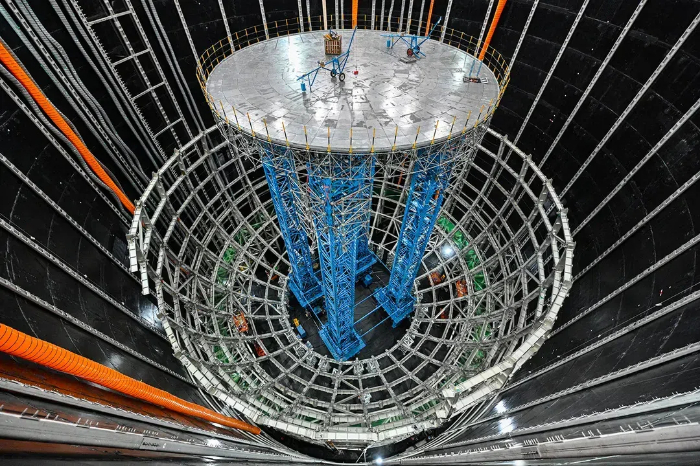
The new neutrino detector at Jiangmen Underground Neutrino Observatory, located 700 meters below ground, was recently built up, signaling the near completion of the significant scientific facility.
At the core of the observatory lies the neutrino detector, buried deep within the granite layer of a hill in Kaiping city, administered by the prefecture-level city of Jiangmen city in South China's Guangdong province, boasting a diameter of 35 meters and comprising 263 pieces of organic glass.
It stands as the world's largest monolithic organic glass structure with a net weight of about 600 metric tons. Each glass panel is a mere 120 millimeters thick.
The glass structure was provided with acrylic sheets and assembled on-site by Jiangsu Donchamp New Materials Technology, based in the Taixing Economic Development Zone, located in Taixing, in East China's Jiangsu province. It is a premium manufacturer of cell cast and extruded acrylic sheet and block products.
To ensure the smooth progress of the structure's development and manufacturing, Donchamp constructed a high-standard workshop, established dedicated production lines and acquired various intelligent digital production equipment, including temperature-controlled workshops.
It also overcame a series of challenges in equipment, research and development and processes, and assigned a professional team for on-site installation.
Overall, the completion of the neutrino detector at Jiangmen Underground Neutrino Observatory represents a significant milestone in the advancement of neutrino research. It underscores the collaborative efforts of companies like Donchamp in pushing the boundaries of scientific exploration.
As a global comprehensive supplier of acrylic glass, Donchamp has a sound research and development system and has signed industry-academia-research cooperation agreements with top universities such as Tsinghua University.

The installation and lifting platform for the cutting-edge glass structure. [Photo/WeChat account: txzhtx]